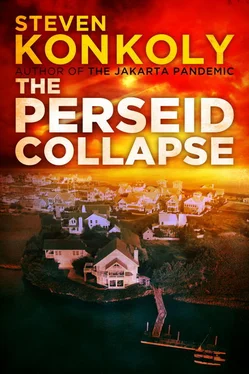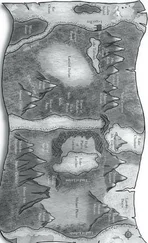Once power returned, a multitude of complicated challenges would surface. They would have to replace all of the electrical components in their furnace, if the furnace was even salvageable after sitting in salt water for several days. Not to mention the fact that they would be competing for parts and service with millions of other households. They all had wood-burning stoves, which could carry them through the winter if they could scrounge enough wood. Most of Alex’s wood stack had been washed away by the tsunami. The cord he kept in the garage wouldn’t last him through December.
Windows were another issue. How long would it take for them to get replacement windows? Two years ago, Alex had accidentally cracked one of their family room windows with the back of a shovel while digging in a flowerbed. The replacement window arrived two weeks later. With several million windows shattered in New England alone, it could take over a year. Most people would be forced to contend with plywood, plastic sheeting and duct tape, which would be no match for a Maine winter.
Households would compress their lives into one or two rooms and cannibalize unbroken windows from unused spaces. Depending upon the orientation of the house, this could work. For the three families gathered here, it would be a less than optimal experience. They all lost large sliding glass doors, which opened directly into large, combined kitchen and family areas. No amount of makeshift shuttering could keep the cold out, even with a wood-burning stove blazing at full strength.
Mold was another issue, but now he was just pig-piling the list of reasons why their friends should join them at the farm. Especially since everyone agreed with Alex’s assessment that the situation on the “outside” would explode within the next seventy-two hours, once again sending the hordes north from Connecticut and Massachusetts to pillage the less populated, resource-rich suburbs.
By the time Boston reached critical mass, they would be securely hidden on a picturesque farm, with most of the comforts and amenities of modern life to which they had grown accustomed. Most importantly, they would be together with their families. Space might become an issue, but they’d make it work for as long as anyone cared to stay, even if that meant permanently.
“First, we’ve all made it this far—and we’re going to make it the rest of the way. We’ve come together before to save each other’s asses. Here we are again,” he said, raising his beer.
They all clinked bottles and glasses.
“Second, this isn’t my operation. It may be my suggested plan, but we all have just as much at stake here, so the plan is open to input,” Alex continued. “Lastly, you’re all welcome to stay out at the farm indefinitely. That’s an unconditional offer, and I don’t expect anyone to ever feel like they owe us anything—now or down the line.”
“We appreciate that, Alex, Kate,” said Samantha. “I don’t know what to say other than thank you.”
“Exactly. This is incredible. Thank you,” said Charlie, followed by Linda.
“And thank you for letting us use the Jeep,” Kate said to Ed and Samantha.
“And to Linda for allowing Charlie to join Ed and I in Boston, although I’d really feel better if he was escorting the group to Limerick,” said Alex.
“I ain’t going on a bike ride with the women,” said Charlie. “I’m more use on the high-speed team.”
“He’s going to get himself killed,” said Linda.
Ed snorted. “If Kate doesn’t kill him first.”
“Hey, hey. I didn’t mean any offense to the women. I just. I just—”
“You should quit while you’re ahead, Charlie,” said Alex.
Charlie nodded. “Good idea.”
“All right. That does it for the thank yous,” said Alex. “Now we get down to business.”
Alex took several sheets of paper and three maps from a small green backpack he’d carried into the house. “I have a few checklists that each family will need to follow,” he said. He handed a sheet of paper to each family, giving theirs to Kate. “The first sheet is for the bicycle group. This is a watered-down bug-out or BOLT kit. The focus is on mobility and balance while riding, so anything not directly related to hydration, nutrition, and short-term survival has been scratched from the list. Under ideal, casual cycling conditions, the trip should take no more than four to five hours. You’re looking at thirty-five miles taking the shortest route. Given the circumstances, I think you should plan for the possibility of an overnight. Thirty-six hours at the outside, accounting for detours, roadblocks, hiding out—whatever. I can’t imagine any scenario other than capture that would keep you from reaching your destination within that timeframe, and I highly doubt anyone will get close enough to you to do that. Everything on this list will fit into a medium-sized rucksack with room to spare.”
“No sleeping bags?” said Samantha. “We don’t have Gore-Tex shells.”
“If you have some highly compressible bags, that should be fine. I was just trying to keep the weight to a minimum. Water, MREs, first aid and tents are the highest priority,” said Alex.
“And weapons,” added Kate.
“Recommended weapons and ammunition are listed at the bottom. I’d arm the kids if practical,” said Alex.
“What about the Homeland Security mandate?” Linda asked. “I can’t exactly conceal an AR-15.”
“I think you and Kate should plan to break down the rifles and stash them in your packs until you’ve cleared Scarborough. Shouldn’t take more than ten seconds to put one of the ARs into action from the pack if required. Once you hit the back roads near Gorham, you can reassemble and sling them. Everyone should stash their pistols in one of the easy-to-access pouches on your pack, just in case you run into any immediate trouble before clearing town. Holsters too. No reason to give them an excuse to search you. Make sure you wear long pants with cargo pockets for the spare mags,” said Alex.
Kate asked, “What if we’re stopped and searched in Scarborough?”
“The police will have too much on their plate to bother with that. As long as the weapons aren’t obvious, I can’t imagine they’ll bother,” said Alex.
“What if they do?”
“Then you turn over your weapons without incident. Not much you can do in that situation. The last thing we want is trouble with the police. That doesn’t go away,” said Alex, and Kate nodded agreement.
Alex flattened one of the maps. “I’ve highlighted what I think is the best route out of town, with a few alternatives. For security reasons, I haven’t highlighted the entire route. This gets you to Route 5, in East Waterboro. From there it’s pretty much a straight shot to Limerick. Kate knows where to go from there.”
Charlie examined the map and shook his head. “I don’t know if this route will be passable.”
“The mud is going to be rough getting out of here,” Alex told him, “but here’s what I figured we’d do to make it easier for them, without making multiple trips back into the neighborhood.”
“Not here. I mean along Route 1. The Nonesuch River crosses Route 1 just south of where Harrison Road intersects—”
“It’s more of a creek,” interrupted Alex.
“True, but water follows the path of least resistance, and the creek lies lower than the rest of the land. I guarantee the tsunami channeled up through the creek and over Route 1, dumping a ton of mud along the way. Hell, the marsh extending past Pine Point Beach extends into half of southern Scarborough—all less than a mile from Route 1. The whole marsh is at sea level. I wouldn’t count on them passing through much of downtown Scarborough.”
“I think he’s right, Alex,” said Ed.
Читать дальше












